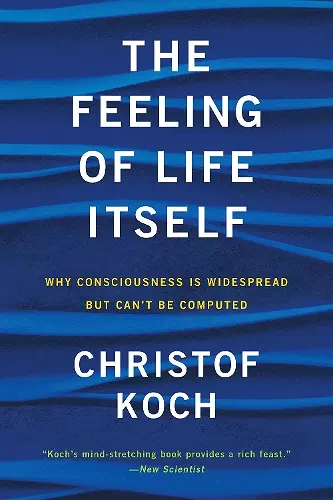The Feeling of Life Itself
Format:Paperback
Publisher:MIT Press Ltd
Published:1st Sep '20
Should be back in stock very soon

A thought-provoking argument that consciousness—more widespread than previously assumed—is the feeling of being alive, not a type of computation or a clever hack
In The Feeling of Life Itself, Christof Koch offers a straightforward definition of consciousness as any subjective experience, from the most mundane to the most exalted—the feeling of being alive. Psychologists study which cognitive operations underpin a given conscious perception. Neuroscientists track the neural correlates of consciousness in the brain, the organ of the mind. But why the brain and not, say, the liver? How can the brain—three pounds of highly excitable matter, a piece of furniture in the universe, subject to the same laws of physics as any other piece—give rise to subjective experience? Koch argues that what is needed to answer these questions is a quantitative theory that starts with experience and proceeds to the brain. In The Feeling of Life Itself, Koch outlines such a theory, based on integrated information.
Koch describes how the theory explains many facts about the neurology of consciousness and how it has been used to build a clinically useful consciousness meter. The theory predicts that many, and perhaps all, animals experience the sights and sounds of life; consciousness is much more widespread than conventionally assumed. Contrary to received wisdom, however, Koch argues that programmable computers will not have consciousness. Even a perfect software model of the brain is not conscious. Its simulation is fake consciousness. Consciousness is not a special type of computation—it is not a clever hack. Consciousness is about being.
"Christof Koch has been leading the charge in consciousness science since there was a charge to lead. His latest book showcases his writerly instincts as well as his scientific acumen, drawing on his deep involvement in the field to paint a compelling picture of the science of experience itself." – Anil K. Seth, Professor of Cognitive and Computational Neuroscience, University of Sussex; editor of 30 Second Brain
"Koch’s controversial and witty book provides a broad view of consciousness, together with a thorough review of his scientific research, inspired by Francis Crick. It discusses issues such as the existence of consciousness in other species and attempts at developing tools and techniques to measure it." – Ada Yonath, Director of the Helen and Milton A. Kimmelman Center for Biomolecular Structure and Assembly of the Weizmann Institute of Science; winner of the Nobel Prize in Chemistry, 2009
ISBN: 9780262539555
Dimensions: unknown
Weight: unknown
280 pages